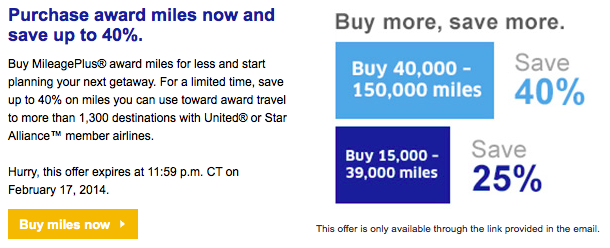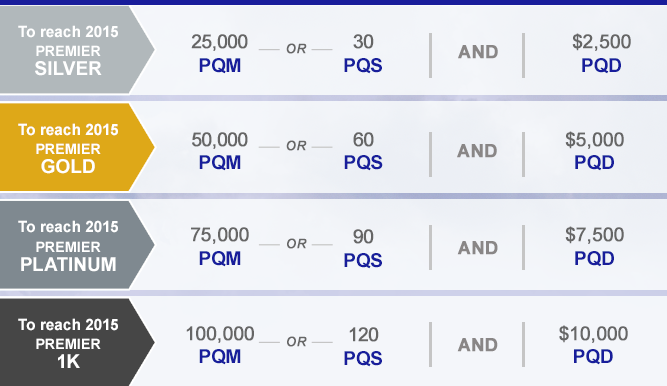Ross emailed me yesterday with a question about the United MileagePlus Explorer credit card. His question wasn’t so much about how to earn the bonus miles offered for new applications but what the difference is between award miles, qualifying miles, and qualifying dollars. It is probably the most common question I receive about how to get started with miles and points. Beyond United Airlines, this confusion could apply to most airline loyalty programs, which are significantly more complex than those for hotels, car rentals, or generic bank rewards.
Redeemable Miles (RDM)
Most people are referring to redeemable or award miles when the use the word “miles” in a generic context that isn’t otherwise explained. These are the miles that can be redeemed for an award—often a free flight but sometimes a hotel room, gift card, or some consumer good. Airlines issue lots of these. They may give them to customers who complete a trip, sell them to a credit card issuer (who then gives them to its customers), or partner with other companies like a shopping portal. They may even sell them directly to customers, but that is often the most expensive way of earning them.

As I said, some of the people who get these miles are banks. Rather than offer cash back they instead give their cardholders award miles as an incentive to apply for a card or for ongoing purchases. These miles do not count toward elite status.
Are redeemable miles better than cash back? It depends. Chase offers United miles instead of cash back because it can buy them very cheaply. But that doesn’t mean the miles are actually worth so little. Chase and United assume some people will lose their miles or redeem them for low value awards. If you can work within the limits of the award program and redeem them for a high value award, you may get a better deal than the average cardholder. If you like flexibility and a fixed value, then a cash back card could make more sense.
Elite Qualifying Miles (EQM)
Elite qualifying miles are tallied separately to determine your elite status in a program. Sometimes the number of EQM and RDM are the same for a certain activity, and sometimes they’re different. For example, a general member of United’s MileagePlus program will get 1,000 RDM and 1,000 EQM for a 1,000-mile journey. A Premier 1K member gets a 100% bonus on award miles, so he will get 2,000 RDM and 1,000 EQM.
Some fares also earn bonus miles for certain fare classes, like a first class ticket, which is calculated on the base miles before any other bonuses. So a Premier 1K member traveling on a first class ticket will earn 1,000 base RDM + 1,000 bonus RDM for status + 500 bonus RDM for fare class. That’s 2,500 redeemable miles.
There may also be a fare class bonus for the EQM. Elite status does not provide a bonus for EQM, so this Premier 1K will earn 1,000 base EQM + 500 bonus EQM for fare class, or 1,500 total.

Keeping track of two kinds of miles is quickly getting more complicated. Nor does it help that each airline refers to their EQM by a different name, e.g., United calls theirs “Premier Qualifying Miles” while Delta calls them “Medallion Qualifying Miles.” EQM is a generic term.
Ross was specifically concerned with whether the bonus miles from his MileagePlus Explorer card would help him earn elite status. The answer is no. Some credit cards do offer elite qualifying miles, but they will specifically call them out, almost always provide a small number, and may list other requirements. Citi offers 10,000 bonus EQM with American Airlines if you reach an annual spend threshold on their Executive / AAdvantage card, but there were different, easier requirements for new customers to get as many as 100,000 redeemable award miles earlier this year.
Elite Qualifying Dollars (EQD)
Delta and United this year moved to a new system where they take into account two measures: elite qualifying miles and elite qualifying dollars. You have to hit both requirements to earn status. However, both offer ways to get an exemption from the EQD requirement if you have a co-branded credit card. (Again, names can vary. United calls these “Premier Qualifying Dollars” while Delta calls them “Medallion Qualifying Dollars.”)

While elite qualifying miles roughly track how far you fly, elite qualifying dollars roughly track how much you spend. Starting next year, both United and Delta will change to a new system that also calculates redeemable award miles based on how much you spend. Because it’s generally more difficult to earn elite qualifying dollars than elite qualifying miles, I’m surprised that they would bother to keep EQMs around. United and Delta may eventually move to a system that only uses award miles and elite qualifying dollars, both of which are determined by ticket cost.
Is There Any Point to Getting a Credit Card without Status?
Finally, Ross wanted to know if there was any point to getting a credit card if the sign-up bonus only includes redeemable miles that wouldn’t count toward elite status. He only flies a couple times a year but does have several thousand dollars a month he can put on the card.
There is definitely an opportunity here. Ross is not likely to earn elite status given his travel habits, but most airline credit cards offer things like priority boarding and a free checked bag. Given how much most airlines have also devalued their loyalty programs, I think the benefits are comparable to low-level status. The sign-up bonus has nothing to do with this. Simply getting the card will provide Ross some value.
The second reason why a card may be a good idea is because of the shift to calculating award miles based on ticket price. As an infrequent flyer but a big-time spender, Ross will earn miles more easily with a credit card than by actually traveling on United. He could then use those miles for upgrade awards or award travel. Upgrade awards can only be used on paid travel, but they are easier to get. If Ross’s travel plans are flexible and he can find award space, I think saving up for an award ticket may be a better value. He may be able to use these award tickets instead of paying cash for those few times he flies.
